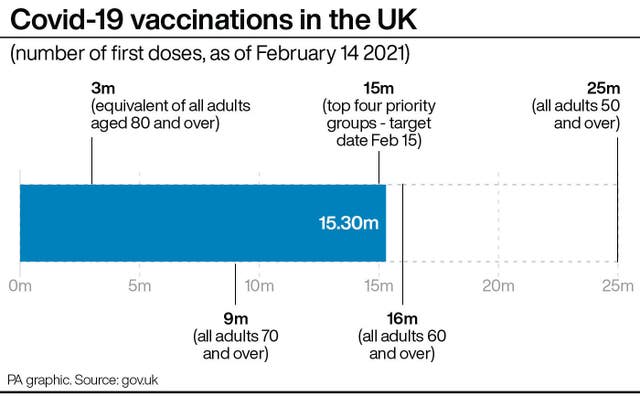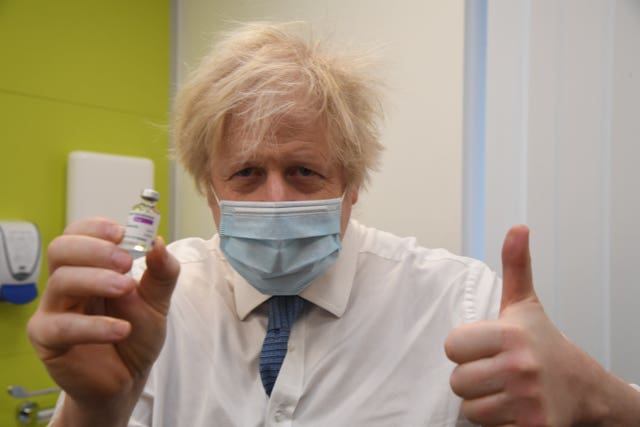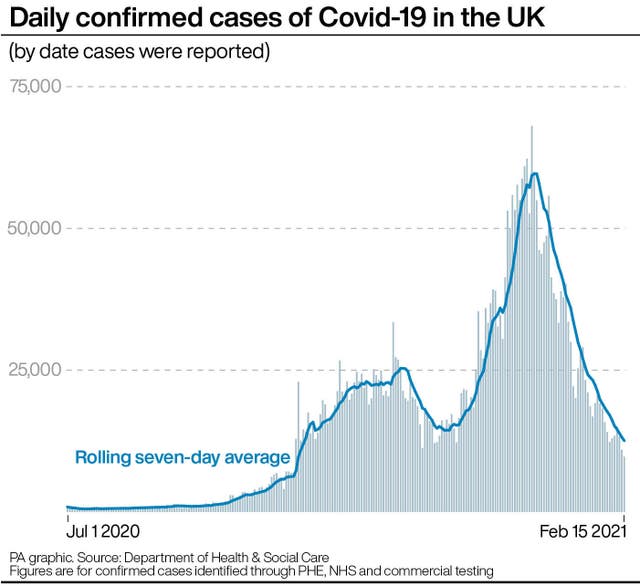PM wants ‘irreversible’ lockdown easing, but cannot guarantee it’s the last
The Prime Minister welcomed an ‘unprecedented national achievement’ of vaccinating 15 million of the most vulnerable people in the UK.

Boris Johnson has said he aims to cautiously ease coronavirus restrictions in an “irreversible” manner, but conceded he cannot offer a “cast iron guarantee” that England’s third national lockdown will be its last.
The Prime Minister welcomed an “unprecedented national achievement” of vaccinating 15 million of the most vulnerable people in the UK ahead of the target deadline on Monday.
But he said that now is “no moment to relax” as ministers reviewing coronavirus restrictions in England come under pressure from lockdown-sceptical Tory MPs to commit to a swift reopening.
Mr Johnson said there are “grounds for confidence” that vaccinations reduce Covid-19’s spread, but said they are awaiting the “hard facts” before setting out the timetable for easing the lockdown.
He told a Downing Street press conference that no decisions had been taken ahead of detailing his “road map” on February 22, urging people to take any speculation with a “pinch of salt”.
“We want this lockdown to be the last. And we want progress to be cautious but also irreversible,” he said.
But, while saying he was “increasingly optimistic” about the possibilities to ease restrictions, the Prime Minister acknowledged he cannot guarantee it is the last lockdown.
“I’m very hopeful that we’ll be able to go ahead and open things up, but to say I can give an absolute cast iron guarantee that we won’t face further difficulties and have to think harder and deeper about some problems, no at this stage I can’t,” he said.

He did not completely rule out the prospect of a domestic “vaccine passport”, but suggested mass vaccine coverage and the use of rapid lateral flow testing is the favoured approach to reopen “the toughest nuts to crack” such as nightclubs and theatres.
Mr Johnson stressed that infections remain “very high”, the NHS is still facing extraordinary pressures, and that, although more than 90% of over-70s had been vaccinated, some 60% of hospital patients with Covid-19 were under that age.
“We have to keep our foot to the floor,” he said, as he called for people to be “optimistic but also patient” about the situation.
He said his plan next week would include “as much as we possibly can about the route to normality, even though some things are very uncertain”.
Earlier, Mr Johnson said no decisions had been made on whether all pupils can return to school at the same time on March 8 after reports suggested a staggered approach may be taken, with secondary schools going back a week later than primaries.
The successful rollout of the vaccine programme is leading to increased pressure from the Covid Recovery Group (CRG) of Conservative MPs to end restrictions quickly.
Over the weekend, more than 60 CRG members signed a letter calling for the Prime Minister to commit to a firm timetable ending with the lifting of all legal controls by the end of April.
During an earlier visit to Orpington Health and Wellbeing Centre in south-east London, Mr Johnson was asked whether pupils would return to schools in England all at once or in a phased approach.
“No decisions have been taken on that sort of detail yet, though clearly schools on March 8 has for a long time been a priority of the Government and of families up and down the country,” Mr Johnson told reporters.
The Prime Minister’s official spokesman said the intention is to “start getting kids back to school from March 8”, but was not ruling out that they could be sent back in stages.
Mr Johnson said he would aim to give target dates for restrictions being eased when he sets out his plan next Monday but “we won’t hesitate” to delay plans if infection rates make it necessary.

Professor Stephen Reicher, a scientist advising the Government’s Covid-19 response, warned that giving dates for lifting restrictions could be damaging if they are not met.
The member of the Scientific Pandemic Insights Group on Behaviours (SPI-B) told the PA news agency: “If things don’t happen on that date then people begin to be hopeless and helpless.
“You begin to have a sense of ‘look, there’s nothing we can do’ and that sense of helplessness is very damaging psychologically.
“I think it’s far more constructive to say to people ‘this is what we can do to get infections down’, to give people something active to do.”
Mr Johnson urged people entitled to a jab to accept them after Health Secretary Matt Hancock suggested around a third of social care staff have not received a vaccine, despite being one of the prioritised groups.
The Prime Minister’s spokesman said the Government favours encouraging care home staff to come forward and accept jabs rather than employers making them mandatory, echoing vaccine minister Nadhim Zahawi, who said such a move would be “discriminatory”.
In other developments:
– Government figures put the number of people to have received a vaccine at 15,300,151 – a rise of 237,962 on the previous day.
– A further 230 people had died within 28 days of testing positive for Covid-19 as of Monday, bringing the official UK total to 117,396.
– A Warwick University study suggested schools do not play a significant role in driving the spread of Covid-19 in the community.
– The first international travellers required to isolate for 10 days at Government-designated quarantine hotels arrived at Heathrow Airport on Monday morning.

The passing of the 15 million vaccinations mark paves the way for the next phase of the rollout, covering the next five priority groups, including the over-50s.
NHS England has already sent out 1.2 million invitations to the over-65s to book an appointment, with a similar number expected to go out this week.
Its chief executive, Sir Simon Stevens, said the end of April target to vaccinate the estimated 17 million people in the next five groups has been set due to “likely vaccine supply”, but added that “if supply increases then we think we can go faster”.
He also confirmed that vaccines are being reserved for second booster doses.





